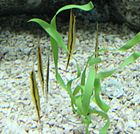Superregnum: Eukaryota
Cladus: Unikonta
Cladus: Opisthokonta
Cladus: Holozoa
Regnum: Animalia
Subregnum: Eumetazoa
Cladus: Bilateria
Cladus: Nephrozoa
Superphylum: Deuterostomia
Phylum: Chordata
Subphylum: Vertebrata
Infraphylum: Gnathostomata
Megaclassis: Osteichthyes
Superclassis/Classis: Actinopterygii
Classis/Subclassis: Actinopteri
Subclassis/Infraclassis: Neopterygii
Infraclassis: Teleostei
Megacohors: Osteoglossocephalai
Supercohors: Clupeocephala
Cohors: Euteleosteomorpha
Subcohors: Neoteleostei
Infracohors: Eurypterygia
Sectio: Ctenosquamata
Subsectio: Acanthomorphata
Divisio/Superordo: Acanthopterygii
Ordo: Syngnathiformes
Familia: Centriscidae
Subfamilia: Centriscinae
Genera: Aeoliscus – Centriscus
Name
Centriscinae Rafinesque, 1810
References
Links
Centriscinae in the World Register of Marine Species
Centriscinae species list in FishBase,
Froese, R. & Pauly, D. (eds.) 2024. FishBase. World Wide Web electronic publication, www.fishbase.org, version 02/2024.
Genera of Centriscinae (including synonyms) in Catalog of Fishes, Eschmeyer, W.N., Fricke, R. & van der Laan, R. (eds.) 2024. Catalog of Fishes electronic version.
Vernacular names
Deutsch: Schnepfenmesserfische
English: Shrimpfishes, razorfishes
Tagalog: Isdanlaringlaring
Shrimpfish, also called razorfish, are five small species of marine fishes in the subfamily Centriscinae of the family Centriscidae. The species in the genera Aeoliscus and Centriscus are found in relatively shallow tropical parts of the Indo-Pacific, while the banded bellowsfish, which often is placed in the subfamily Macroramphosinae instead, is restricted to deeper southern oceans.
Shrimpfish are nearly transparent and flattened from side to side with long snouts and sharp-edged bellies. A thin, dark stripe runs along their bodies. These stripes and their shrimp-like appearance are the source of their name. They swim in a synchronized manner with their heads pointing downwards. Adult shrimpfish are up to 20 cm (7.9 in) long, including their snouts. The banded bellowsfish more closely resembles members of the subfamily Macroramphosinae (especially Notopogon) in both behaviour and body shape, and reaches a length of up to 30 cm (12 in).
Species
| Genera and species of shrimpfishes | |||||||
|---|---|---|---|---|---|---|---|
| Genera | Species | Common name | Image | Comments | Fish Base |
ITIS | IUCN status |
| Aeoliscus | Aeoliscus punctulatus (Bianconi, 1855) |
Speckled shrimpfish | [1] | [2] | Not assessed | ||
| Aeoliscus strigatus (Günther, 1861) |
Razorfish |  |
 The razorfish uniquely adopts a head-down tail-up position as an adaptation for hiding among sea urchin spines.[3] It is generally found in coastal waters from the central Indian Ocean to the Red Sea to Hawaii. Its natural habitat includes beds of sea grasses and coral reefs, where sea urchins are found.[4] The dorsal surface of the razorfish is covered by protective bony plates. They extend past the end of the golden-yellow body and over the tail fin, which terminates in a sharp spine. A dark band runs the length of the fish. The razorfish can grow up to 6 in (15 cm) in the wild.[3] |
[5] | [6] | Not assessed | |
| Centriscops | Centriscops humerosus (Richardson, 1846) |
Banded bellowsfish | .gif/140px-Centriscops_humerosus_(Banded_Bellowsfish).gif) |
The banded bellowsfish is found in southern oceans at depths of 35 to 1,000 m (115 to 3,281 ft). Its length is up to 30 cm (12 in). | [7] | [8] | Not assessed |
| Centriscus | Centriscus cristatus (De Vis, 1885) |
Smooth razorfish | [9] | [10] | Not assessed | ||
| Centriscus scutatus Linnaeus, 1758 |
Grooved razorfish | [11] | [12] | Not assessed | |||
References
Froese, Rainer; Pauly, Daniel (eds.) (2013). "Aeoliscus punctulatu" in FishBase. February 2013 version.
"Gadus morhua". Integrated Taxonomic Information System. Retrieved February 28, 2013.
"Eyewitness handbooks Aquarium Fish: The visual guide to more than 500 marine and freshwater fish varieties" By Dick Mills. Page 283
"Ecology Summary - Aeoliscus strigatus".
Froese, Rainer; Pauly, Daniel (eds.) (2013). "Aeoliscus strigatus" in FishBase. February 2013 version.
"Gadus morhua". Integrated Taxonomic Information System. Retrieved February 28, 2013.
Froese, Rainer; Pauly, Daniel (eds.) (2013). "Centriscops humerosus" in FishBase. February 2013 version.
"Centriscops humerosus". Integrated Taxonomic Information System. Retrieved February 28, 2013.
Froese, Rainer; Pauly, Daniel (eds.) (2013). "Centriscus cristatus" in FishBase. February 2013 version.
"Centriscus cristatus". Integrated Taxonomic Information System. Retrieved February 28, 2013.
Froese, Rainer; Pauly, Daniel (eds.) (2013). "Centriscus scutatus" in FishBase. February 2013 version.
"Centriscus scutatus". Integrated Taxonomic Information System. Retrieved February 28, 2013
Retrieved from "http://en.wikipedia.org/"
All text is available under the terms of the GNU Free Documentation License

